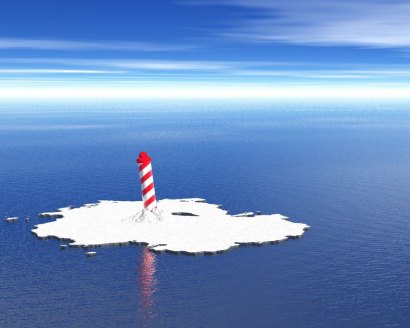
The ice was already thin last summer, and little new ice formed during the past winter, according to the Alfred Wegener Institute, Helmholtz Centre for Polar and Marine Research in Germany. In 2012, the sea ice surface of the Arctic shrunk to a record low of 3.4 million square kilometers.
In making projections, researchers first studied measurements taken from satellite images during the past five winters. They also placed seven snow buoys on sheets of floating ice last autumn. Using those methods, scientists determined the thickness of the snow cover on top of the sea ice, air temperature and air pressure.
“The temperature in the central Arctic in February 2016 exceeded average temperatures by up to 8 degrees Celsius,” an institute news release explained. That warmth will have consequences, and, “large amounts of thick pack ice will be carried away by Arctic sea currents before the autumn.”
The findings were to be presented by Marcel Nicolaus, a sea ice physicist, at a meeting of the European Geosciences Union in Vienna, a nonprofit international organization of scientists.
A HALF DEGREE DIFFERENCE: It doesn’t look like much, but even a half-degree change in temperature could be a serious problem.
Climate change researchers warn that 2 degrees Celsius in warming will have a noticeably larger impact than a 1.5 degree change, according to research published April 21 in Earth System Dynamics, an open access journal of the European Geosciences Union.
The half-degree difference could have detrimental consequences for crops in Central America and West Africa, the research reported. Warming would also affect tropical coral reefs. A 1.5 degree increase would provide opportunity for the coral to adapt. “In a scenario with an end-of-century warming of 2 degrees C, virtually all tropical coral reefs are projected to be at risk of severe degradation due to temperature-induced bleaching from 2050 onward,” the research reports.
The research, "Differential climate impacts for policy-relevant limits to global warming: the case of 1.5 degrees Celsius and 2 degrees Celsius," led by Carl-Friedrich Schleussner of the Potsdam Institute for Climate Impact Research in Germany, was published in Earth System Dynamics.
Related:
Climate change could be fast, irreversible
In brief: Extreme outbreaks more common
If you would like to comment, give us a shout, or like us on Facebook and tell us what you think.